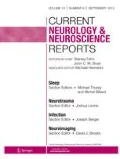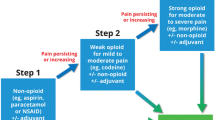Abstract
Clinicians have long recognized the enormous variability of recovery among patients with aphasia. Accordingly, the identification of specific factors most important in determining the extent of recovery has been the subject of many investigations. Yet, the reasons for two patients of the same age, nearly identical clinical presentations, and similar MRI findings having completely dissimilar recoveries are still unknown. It remains difficult for a clinician to make a valid prognosis of language recovery in an individual patient. This article provides a review of aphasia-recovery research and a framework for approaching the variability of recovery in clinical practice.
Similar content being viewed by others
References and Recommended Reading
Code C: Multifactorial processes in recovery from aphasia: developing the foundations for a multileveled framework. Brain Lang 2001, 77:25–44.
Marsh EB, Hillis AE: Recovery from aphasia following brain injury: the role of reorganization. Prog Brain Res 2006, 157:143–156.
Hillis AE: Aphasia: progress in the last quarter of a century. Neurology 2007, 69:200–213.
Kertesz A, McCabe P: Recovery patterns and prognosis in aphasia. Brain 1977, 100(Pt 1):1–18.
Marquardsen J: The natural history of acute cerebrovascular disease. A retrospective study of 769 patients. Acta Neurol Scand Suppl 1969, 38:67–68.
Enderby P, Wood VA, Wade DT, et al.: Aphasia after stroke: a detailed study of recovery in the first 3 months. Int Rehabil Med 1987, 8:162–165.
Pedersen PM, Jørgensen HS, Nakayama H, et al.: Aphasia in acute stroke: incidence, determinants, and recovery. Ann Neurol 1995, 38:659–666.
Laska AC, Hellblom A, Murray V, et al.: Aphasia in acute stroke and relation to outcome. J Intern Med 2001, 249:413–422.
Pedersen PM, Vinter K, Olsen TS: Aphasia after stroke: type, severity and prognosis. The Copenhagen aphasia study. Cerebrovasc Dis 2004, 17:35–43.
Pashek GV, Holland AL: Evolution of aphasia in the first year post-onset. Cortex 1988, 24:411–423.
Godefroy O, Dubois C, Debachy B, et al.: Vascular aphasias: main characteristics of patients hospitalized in acute stroke units. Stroke 2002, 33:702–705.
Bakheit AM, Shaw S, Carrington S, et al.: The rate and extent of improvement with therapy from the different types of aphasia in the first year after stroke. Clin Rehabil 2007, 21:941–949.
Sarno MT, Levita E: Recovery in treated aphasia in the first year post-stroke. Stroke 1979, 10:663–670.
Demeurisse G, Demol O, Derouck M, et al.: Quantitative study of the rate of recovery from aphasia due to ischemic stroke. Stroke 1980, 11:455–458.
Vignolo LA: Evolution of aphasia and language rehabilitation: a retrospective explorative study. Cortex 1965, 1:344–367.
Basso A, Faglioni P, Vignolo LA: Controlled study of language re-education in aphasia: comparison between treated and untreated aphasics [in French]. Rev Neurol (Paris) 1975, 131:607–614.
Wade DT, Hewer RL, David RM, et al.: Aphasia after stroke: natural history and associated deficits. J Neurol Neurosurg Psychiatry 1986, 49:11–16.
Lazar RM, Speizer AE, Festa JR, et al.: Variability in language recovery after first-time stroke. J Neurol Neurosurg Psychiatry 2008, 79:530–534.
Lendrem W, Lincoln NB: Spontaneous recovery of language in patients with aphasia between 4 and 34 weeks after stroke. J Neurol Neurosurg Psychiatry 1985, 48:743–748.
Naeser MA, Palumbo CL, Prete MN, et al.: Visible changes in lesion borders on CT scan after five years poststroke, and long-term recovery in aphasia. Brain Lang 1998, 62:1–28.
Fitzpatrick P, Glosser G, Helm-Estabrooks N: Long term recovery of linguistic and nonlinguistic functions in aphasia. Presented at the annual meeting of the Academy of Aphasia. Montreal; 1988.
Inatomi Y, Yonehara T, Omiya S, et al.: Aphasia during the acute phase in ischemic stroke. Cerebrovasc Dis 2008, 25:316–323.
Shaywitz BA, Shaywitz SE, Pugh KR, et al.: Sex differences in the functional origin of the brain for language. Nature 1995, 373:607–609.
Holland AL, Greenhouse JB, Fromm D, et al.: Predictors of language restitution following stroke: a multivariate analysis. J Speech Hear Res 1989, 32:232–238.
Kertesz A, Sheppard A: The epidemiology of aphasic and cognitive impairment in stroke: age, sex, aphasia type and laterality differences. Brain 1981, 104:117–128.
Springer S, Deutsch G: Right Brain, Left Brain: Perspectives from Cognitive Neuroscience. New York: WH Freeman and Co.; 1998.
Connor LT, Obler LK, Tocco M, et al.: Effect of socioeconomic status on aphasia severity and recovery. Brain Lang 2001, 78:254–257.
Kertesz A, Lau WK, Polk M: The structural determinants of recovery in Wernicke’s aphasia. Brain Lang 1993, 44:153–164.
Selnes OA, Knopman DS, Niccum N, et al.: Computed tomographic scan correlates of auditory comprehension deficits in aphasia: a prospective study. Ann Neurol 1983, 13:558–566.
Naeser MA, Palumbo CL, Helm-Estabrooks N, et al.: Severe nonfluency in aphasia. Role of the medial subcallosal fasciculus and other white matter pathways in recovery of spontaneous speech. Brain 1989, 112(Pt 1):1–38.
Naeser MA, Helm-Estabrooks N, Haas G, et al.: Relationship between lesion extent in’ Wernicke’s area’ on computed tomographic scan and predicting recovery of comprehension in Wernicke’s aphasia. Arch Neurol 1987, 44:73–82.
Kertesz A, Harlock W, Coates R: Computer tomographic localization, lesion size, and prognosis in aphasia and nonverbal impairment. Brain Lang 1979, 8:34–50.
Saffran EM, Bogyo LC, Schwartz M, et al.: Does deep dyslexia reflect right hemisphere reading? In Deep Dyslexia. Edited by Coltheart M, Patterson K, Marshall J. London: Routledge and Kegan Paul; 1980:381–406.
Greener JP, Enderby P, Whurr R: Speech and language therapy for aphasia following stroke. Cochrane Database Syst Rev 2000, (2):CD000425.
Beeson PM, Robey RR: Evaluating single-subject treatment research: lessons learned from the aphasia literature. Neuropsychol Rev 2006, 16:161–169.
Wertz RT, Weiss DG, Aten JL, et al.: Comparison of clinic, home, and deferred language treatment for aphasia. A Veterans Administration cooperative study. Arch Neurol 1986, 43:653–658.
Author information
Authors and Affiliations
Corresponding author
Rights and permissions
About this article
Cite this article
Lazar, R.M., Antoniello, D. Variability in recovery from aphasia. Curr Neurol Neurosci Rep 8, 497–502 (2008). https://doi.org/10.1007/s11910-008-0079-x
Published:
Issue Date:
DOI: https://doi.org/10.1007/s11910-008-0079-x




